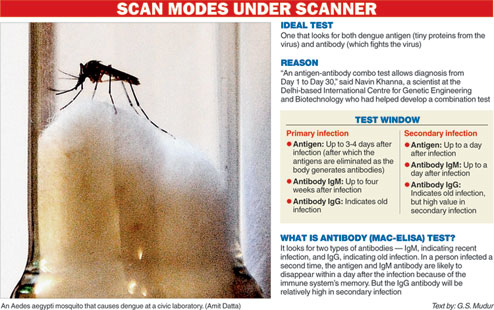 |
A diagnostic test that the state government has dismissed as unreliable is the simplest way to detect dengue early and fight it despite the possibility of false-positive results, according to experts.
The state health department has said it does not recognise the NS1 rapid antigen test as reliable because “it is not recommended by the Union health ministry”. Some senior officials have blamed a section of private hospitals and clinics for people spending on antigen tests that might sometimes throw up “false-positive” results.
Virologists say a combination test that looks simultaneously for direct evidence of the dengue virus as well as antibodies against it is far superior to exclusive antibody tests favoured by the public health authorities.
Other than that, the NS1 rapid antigen test is the only way a dengue infection can be diagnosed in its earliest phase. “Antigen tests are superior because they look for something that shows up in the early phase of the infection,” said Prasanta Ghosh, a former adviser and technology transfer specialist in the department of biotechnology.
Antigens indicating a dengue infection circulate in the bloodstream within a day or two of the patient being bitten by the Aedes aegypti mosquito. The antigens challenge the immune system, which then produces antibodies against the virus a few days after the infection.
Antibodies can thus be picked up by standard confirmatory tests only six or seven days after the infection, microbiologists say. “Early antibody tests will be negative, and over the seven days, a patient may recover or, in the rare cases, become worse,” Ghosh said.
Amitabha Nandy, director of the Centre for Studies on Infection and Immunity in Calcutta, cited medical evidence to make out a case for a balanced approach to dengue diagnosis. “NS1 antigen test results, confirmatory diagnosis, treatment and complications run parallel. The fact remains that in the majority of cases where complications like haemorrhagic features and shock have led to death, diagnosis has been supported by a positive NS1 antigen test at the beginning of the illness,” he said.
Doctors treating dengue patients in city hospitals said it was better to get a rapid antigen test done rather than wait more than a week for the confirmatory Elisa test.
 |
“MAC-ELISA is more accurate and a standardised test for dengue, but its timing is crucial. If the NS1 rapid test is matched by clinical symptoms, we can immediately go for treatment,” said consultant physician Sukumar Mukherjee.
“Once we get the indication, platelet count monitoring cane be done every day along with fluid therapy, preventing complications.”
Officials of private hospitals flooded with dengue patients said 70 to 80 per cent of the NS1 rapid tests showing dengue-positive results were later endorsed by matching results in the MAC-ELISA IgM antibody test.
At CMRI, 40 of the 116 blood samples taken for NS1 rapid tests till Monday were found positive.
“The MAC-ELISA test was done after five days of fever and 29 of those 40 were confirmed positive,” said Rupak Barua, the chief operating officer of the hospital.
Belle Vue Clinic has found 10 blood samples positive through the NS1 test since August 30, of which the MAC-ELISA method has confirmed seven.
But experts warn that in some cases the MAC-ELISA method throwing up a negative result is no guarantee that a person hasn’t been infected.
“Sometimes blood samples are collected before five days after the onset of fever. Antibodies may not have developed by then and, therefore, wouldn’t show up in the MAC-ELISA test. But an antigen test will catch the virus,” said a city-based virologist.
The state health department is in denial mode despite its official website reporting the death of four dengue patients whose NS1 antigen tests were positive and MAC-ELISA tests were negative.
Asit Biswas, spokesperson for the health department, said the administration would spend Rs 9 lakh on procuring kits for the more accurate NS1-ELISA rapid test. “They will be available in all state-run and CMC laboratories.”











